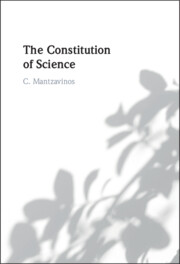Book contents
- The Constitution of Science
- Reviews
- The Constitution of Science
- Copyright page
- Epigraph
- Contents
- Acknowledgements
- Introduction
- 1 The Scaffolds Humans Erect on Science
- 2 Science and Values
- 3 Normativity
- 4 The Informal Institutions of Science
- 5 Core Scientific Activities
- 6 The Formal Institutions of Science
- 7 The Search for an Adequate Constitution
- 8 Five Principles for a Quasi-Autonomous Science
- Epilogue
- Excursus
- Notes
- References
- Index
4 - The Informal Institutions of Science
Published online by Cambridge University Press: 05 December 2024
- The Constitution of Science
- Reviews
- The Constitution of Science
- Copyright page
- Epigraph
- Contents
- Acknowledgements
- Introduction
- 1 The Scaffolds Humans Erect on Science
- 2 Science and Values
- 3 Normativity
- 4 The Informal Institutions of Science
- 5 Core Scientific Activities
- 6 The Formal Institutions of Science
- 7 The Search for an Adequate Constitution
- 8 Five Principles for a Quasi-Autonomous Science
- Epilogue
- Excursus
- Notes
- References
- Index
Summary
The scientific enterprise is embedded in the institutional framework of the society consisting of informal and formal institutions. What we call “science” is not a means toward the accomplishment of anything. It is, instead, the institutional embodiment of the processes of constructing and criticizing solutions to theoretical problems that are entered into by individuals in their several abilities and skills. What we call the Scientific Method is constituted by the informal institutions that have originally emerged and diffused during the Scientific Revolution, consisting of essentially three types of rules, the scientific conventions, the moral rules and the scientific techniques. The term should be understood as a type, with the different informal institutions of science being the tokens. The scientific method may take very different forms, but as long as it consists in the techniques of bringing the products of our theoretical imagination in contact with empirical data by scientists following the scientific conventions of their time and the moral rules necessary for this kind of epistemic problem-solving, it remains a distinctive way of grasping the structure of the world.
Keywords
- Type
- Chapter
- Information
- The Constitution of Science , pp. 22 - 58Publisher: Cambridge University PressPrint publication year: 2024

